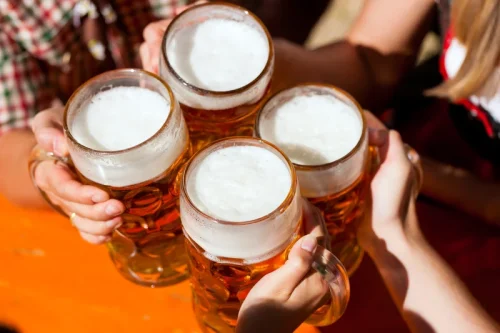Alcohol and Depression: The Link Between Alcoholism and Depression

Alcohol changes our body’s sleep schedule and stops the important REM sleep, which helps our minds and emotions recover. Even though drinking can sometimes make you fall asleep quicker, it often leads to a rough and unrefreshing night, disrupted by needing to use the toilet more or feeling thirsty throughout the night. Poor sleep can make mental health issues like depression and anxiety worse.
- Studies reveal that heavy drinkers experience much more signs of depression and anxiety, highlighting the powerful connection between alcohol-induced brain changes and emotional health.
- Understanding the intricate link between alcoholism and depression highlights the importance in addressing both the conditions.
- This is the most important reason of all to just avoid drinking alcohol while using antidepressants.
- Talk to your doctor and work out a plan to safely lower your alcohol consumption.
Brief Motivationally Focused Interventions May Effectively Address Alcohol Use Among Depressed Patients
Quitting smoking and stopping alcohol consumption can be beneficial for health and reduce the risk of related health conditions. People experiencing depression or anxiety may resort to alcohol to self-medicate and alleviate symptoms temporarily, without realising the potential long-term damage. Unfortunately, this coping mechanism can create a vicious cycle, as alcohol can worsen underlying mental health issues, leading to increased reliance on substances for relief. Drinking does more than cause you to fall down or slur your words. Co-occurring mental illnesses, like depression, with alcohol or drug use disorders is common and problematic. While they are treatable, management for a dual diagnosis is much more challenging.
- Enjoying a drink now and then is usually fine, but excessive drinking can lead to a host of physical health problems.
- Even among patients whose alcohol use does not rise to the level of an alcohol-use disorder, drinking can have a deleterious effect on depression and depressive symptoms and may dampen the impact of treatment for depression.
- At the very least, he says—especially for people on antidepressants—it’s a good idea to cut back to a fairly minimal amount of alcohol.
- Depressed male problem drinkers were three times as likely to become daily drinkers compared with their cohort of nondepressed problem drinkers (Crum et al., 2001).
- But if you have trouble managing your drinking, become fixated on alcohol, or keep drinking even though it may cause issues, you might have alcohol use disorder.
What Does It Mean To Have a Substance Abuse Problem?
- On the other hand, both conditions also share certain risk factors, such as genetics and social isolation.
- Talk to your GP or local health professional if you think that you will find it hard to stop drinking.
- Shortly after becoming a mother, Kitley began coping with her depression through binge drinking.
- Children who have major depression as a child may drink earlier in life, according to one study.
Start by setting small goals and over time, it will become more of a habit. When you’re hungover, you’re experiencing this rebound effect—the good stuff has tanked and the bad stuff is very present. If you are concerned that you or someone you care about has a problem with alcohol there is a lot of help available. Here you can find does drinking make your depression worse useful links and phone numbers to get the support you need. Remember to tell them about how much you drink or, if you’ve stopped, how long you’ve been alcohol-free. Your GP may recommend a talking therapy such as counselling or CBT (Cognitive Behavioural Therapy), or a self-help group.

Outlook for smoking and drinking
His research focuses on the intersection of primary care, mental health, and substance abuse treatment. One study of 421 people found that 25% had both alcohol misuse and depression. Some experts also suggest that both depression and alcohol use disorders share underlying pathophysiology in that they are both neuroinflammatory conditions. Depression is a common and serious mood disorder, which can impact your thoughts, feelings, and behaviors. In the United States alone, an estimated 17.3 million adults have had at least one major depressive episode. Alcohol can produce feelings of euphoria and excitement, making you feel instantly happier and more confident, but those feelings are fleeting.
Health Conditions
Dr. Solomon also suggests doing things that distract you and take your mind off feeling bad for yourself—no, that doesn’t mean lying on the couch watching a Grey’s Anatomy marathon. Connect with other people, or immerse yourself in an activity you enjoy to help you focus on something else than your bum mood. Since alcohol https://ecosoberhouse.com/ disinhibits us, it can lead us to do things we wouldn’t normally do, says Renee Solomon, PsyD, a Beverly Hills-based clinical psychologist and CEO of Forward Recovery. “People can wake up feeling more depressed and anxious because of what they did the night before,” she says.

Explaining Sensitization in the Context of Addiction Relapse
- However, while more research is still necessary, the WHO states that there is no safe level of alcohol consumption that does not affect health.
- If you have depression and anxiety and want to drink alcohol, there are some considerations.
- You might feel depressed after drinking because alcohol itself is a depressant.
- And if you’re worried about your drinking, there are alcohol support services that can help.
While this can feel good for a short time, this effect doesn’t last for long. The feelings of bliss wear off, and they can worsen your depression symptoms. Previous trauma is also a risk factor for alcohol misuse and depression. Children who have major depression as a child may drink earlier in life, according to one study. Research has linked the development of depression symptoms in adolescents to regular or heavy alcohol use.

This includes roughly 1.3 million people who do not smoke but die as a result of secondhand smoke exposure. A GP can give you information about support services or counselling. If you are worried about your alcohol use, take our alcohol test to find out what type of drinker you are. We respectfully acknowledge the University of Arizona is on the land and territories of Indigenous peoples.

How alcohol impacts the body
Variations in this gene might put people at risk of both alcohol misuse and depression. Regular drinking can lead to depression, and depressed people are also more likely to drink too much. Alcohol can significantly impact the levels of neurotransmitters in your marijuana addiction brain, making depression worse. Antidepressants can help even levels of these chemicals and can help relieve symptoms of depression.

